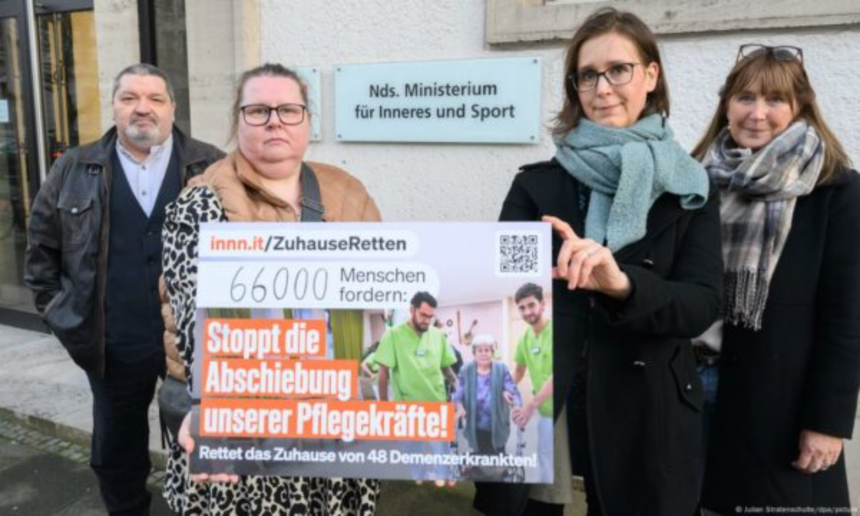Ten Colombian assistant nurses were supposed to be deported from Germany, at a time when they were desperately needed at a dementia care center. This case highlights the difficulties Germany faces with labor migration.
Andrea and Tino Wohlmacher should have been popping champagne corks by now. They have just secured their first small victory in the bureaucratic jungle of asylum applications, skilled worker immigration, and deportations. However, the operators of the care center for dementia patients in Wilstedt near Bremen still have plenty of work to do and no time to celebrate. The center cares for 48 people in Germany.
The ten Colombian nurses employed there are not to be deported; they are allowed to stay for now, with permits granted initially due to their two- or three-year professional training. Andrea Wohlmacher told DW: “It feels like a weight has been lifted off our shoulders.”
From Asylum to Employment?
The story of the ten Colombians serves as a useful lesson in understanding how difficult it still is for Germany to attract and retain urgently needed workers while also clearly separating asylum from migration for employment purposes. The unskilled South Americans initially applied for asylum, but it was rejected. As a result, they could not transition to the qualified immigration procedure through a so-called “lane change” legally. The threatening scenario: All the Colombians were to be deported from Germany, which would have meant the closure of the care center due to a lack of staff.
Andrea Wohlmacher is convinced. “I think we are the prime example of the migration that is necessary. And this is not only true for skilled workers. We have had a shortage of workers in Germany, especially in the nursing sector, for decades.” According to the German Nursing Council, there is already a shortage of around 115,000 professional nurses in full-time positions in Germany. The sector is understaffed, and many hospitals and elderly care centers can only survive with staff from abroad.
The Case Reaches Health Minister Lauterbach
When their ten workers were threatened with deportation, the two managers of the health center appealed to the public. They wrote an open letter to eight politicians, and even TV teams showed up in Wilstedt. 83,782 people signed a petition addressed to the federal government. Even Federal Health Minister Karl Lauterbach personally acknowledged the petition.
The case sparked debates across Germany: How can well-integrated people who pay taxes and work day and night for those in need be forced to leave the country? But there is also the other side of the coin: What kind of message does Germany send abroad if rejected asylum seekers without proper training are allowed to stay? The final decision now lies with the Special Commission of Lower Saxony.
Federal Health Minister Karl Lauterbach promised that he would do everything possible within the bounds of the law. “Without foreign nursing staff, we would no longer be able to provide healthcare at the same level in Germany,” Lauterbach said, adding that a message needs to be sent: “Foreign nursing staff are very welcome here because we depend on them, and we have had very good experiences with them.”
Reducing Asylum Requests, Increasing Employment
Andrea Wohlmacher is certain that without public attention and talks with politicians, the fear of short-term deportation would still exist. Joachim Stamp, the federal government’s special representative for migration agreements, has been tasked with ensuring that skilled worker immigration to Germany proceeds in an orderly fashion, not through a possibly futile asylum application. Stamp even held talks recently in the Colombian capital Bogotá. “We want to reduce irregular migration and enable better management of migration for employment purposes. I have also made it clear publicly in the Colombian media that the path to the German labor market does not go through the asylum law but only through regular skilled worker immigration,” Stamp told DW.
Currently, 14,000 Colombians living in Germany are employed with social security contributions. There are also 3,500 students and postgraduates, and about 500 employees working as researchers. Through an inclusive migration partnership with countries like Colombia, as well as Georgia, Uzbekistan, Morocco, and Kenya, Germany aims to promote regular migration for employment and reduce the number of asylum requests that have no chance of recognition from citizens of these countries.







